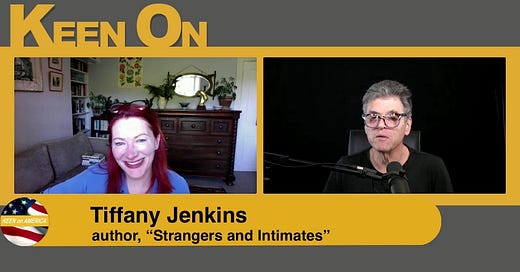So who killed privacy? It's the central question of Tiffany Jenkins' provocative new history of private life, Strangers and Intimates. The answer, according to Jenkins, is that we are all complicit—having gradually and often accidentally contributed to privacy's demise from the 16th century onwards. Luther started it by challenging Papal religious authority and the public sacraments, thereby creating the necessity of private conscience. Then came Enlightenment philosophers like Locke and Hobbes who carved out bounded private political and economic spheres establishing the foundations for modern capitalism and democracy. Counter-enlightenment romantics like Rousseau reacted against this by fetishizing individual innocence and authenticity, while the Victorians elevated the domestic realm as sacred. Last but not least, there's Mark Zuckerberg's socially networked age, in which we voluntarily broadcast our private lives to a worldwide audience. But why, I ask Jenkins, should we care about the death of private life in our current hyper-individualistic age? Can it be saved by more or less obsession with the self? Or might it require us to return to the world before Martin Luther, a place Thomas More half satiricizes Utopia, where “private life” was a dangerously foreign idea.
1. Privacy is a Historical Accident, Not a Natural Human Condition
"There was a sense in which you shouldn't do anything privately that they wouldn't do publicly... This wasn't a kind of property-based private life." Jenkins argues that before the 17th century, the very concept of leading a separate private life didn't exist—privacy as we understand it is a relatively recent invention.
2. Martin Luther Accidentally Created Modern Privacy Through Religious Rebellion
"Luther inadvertently... authorized the self as against, in his case, the Catholic Church... if you follow the debates over the kind of beginnings of a private sphere and its expansion, whether you're reading Locke or Hobbes, there's a discussion about... the limits of authority." Luther's challenge to religious authority unintentionally created the need for private conscience, sparking centuries of development toward individual privacy.
3. The Digital Age Represents a Return to Pre-Privacy Transparency
"I think we do live in a period where there is little distinction between public and private, where the idea that you might keep something to yourself is seen as strange, as inauthentic." Jenkins suggests our current era of social media oversharing resembles pre-modern times more than the Victorian peak of privacy.
4. Modern Loneliness Stems From Social Fragmentation, Not Individual Psychology
"I sometimes wonder if we're pathologizing, actually, what is a social problem, which is a society where people are fragmented, not quite sure how to go beyond themselves... I would see that as a social problem." Rather than treating loneliness as a personal issue, Jenkins argues it reflects the breakdown of intermediate institutions between family and state.
5. Technology Doesn't Determine Our Privacy—We Do
"Can't blame the tech, tech isn't the problem... It comes down really to what sort of society we want to live in and how we want to be treated. That's not a technical thing. That has not to do with technology. That's to do humans." Jenkins rejects technological determinism, arguing that privacy's fate depends on human choices about social organization, not inevitable technological forces.














Share this post